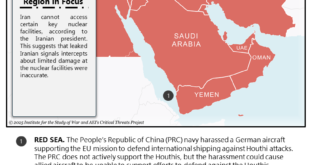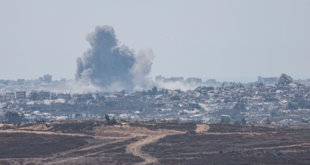 Since July 3, when Pakistani troops laid siege and eventually stormed the Lal Masjid (Red Mosque) in Islamabad, more than 100 people, mostly from the security forces, have been killed in attacks in North-West Frontier Province (NWFP), primarily in the Swat region over the past few days.
Since July 3, when Pakistani troops laid siege and eventually stormed the Lal Masjid (Red Mosque) in Islamabad, more than 100 people, mostly from the security forces, have been killed in attacks in North-West Frontier Province (NWFP), primarily in the Swat region over the past few days.
Â
The banned pro-Taliban Tehrik-Nifaz-i-Shariat-i-Mohammadi (TNSM – Movement for the Enforcement of Islamic Laws) has extensive influence in this region, fueled by its leader, Maulana Fazlullah.
Many of the students at the Red Mosque and associated madrassa students were believed to have been from NWFP, where revenge is now being exacted against security forces. The army has mobilized thousands of troops to the area.
Â
Similarly, the Pakistani Taliban in North Waziristan announced on Sunday that their 10-month peace deal with the government was over. Fighters said that the deal – aimed at curbing cross-border raids into Afghanistan – was no longer in effect and that they would resume attacks on the Pakistan Army.
Â
To the south of Swat in Mamoon, in Bajaur Agency of the Federally Administered Tribal Areas (FATA) of Pakistan, the situation is equally restive, but the focus of local militancy is directed across the border in Afghanistan against the foreign troops there.
Â
Western intelligence believes that Osama bin Laden, his deputy Dr Ayman al-Zawahiri, Gulbuddin Hekmatyar and other top al-Qaeda and Taliban leaders have free access in this region to meet and plan operations. Cross-border raids into Afghanistan are frequently staged from here.
Â
The Bajaur area has been hit twice by Central Intelligence Agency predator drones, one specifically after Zawahiri. However, at a time when al-Qaeda is reactivated and the Taliban’s main focus is to lay siege of Kabul, via adjacent Nooristan province in Afghanistan, aerial surveillance is considered insufficient.
Â
As a result, a large US base is under construction on a mountaintop at Ghakhi Pass on the Pakistan-Afghanistan (Bajaur) border.
Â
Students believe this is in preparation for an operation inside Pakistan to clamp down on them as well as to renew the hunt for bin Laden and his associates. As a result, the students have attacked the new base in an attempt to delay its construction.
Â
“This is a matter of life and death for the mujahideen. We will shed our blood, but we will never let this base be completed,” Dr Ismail told Asia Times Online while standing at the grave of his son, who was killed a few weeks ago by US forces while attacking the base.
Â
The tall and well-built Ismail is the leader of the TNSM and a main source of inspiration for the jihadis in Bajaur. “My son sacrificed his life against American designs to build this base over our heads. I shall never allow them to complete it, I will fight till my last.
Â
“Martyrdom for the cause of jihad is actually an open invitation to all Muslims to join forces with the mujahideen. The fresh faces of the mujahideen after martyrdom, the aroma from their flesh and blood, are living miracles and prompt youths of the area to join forces with the mujahideen to defeat the Western coalition in Afghanistan,” Ismail said.
Â
Ismail’s narrative of the “miracles” has been a revelation for many and the number of jihadis has skyrocketed in Bajaur Agency in the past few months, along with a deterioration in the law-and-order situation.
Â
Bajaur is a relatively progressive region in the FATA, in contrast to the North Waziristan and South Waziristan tribal areas. It has a high literacy rate thanks to its network of schools and colleges, and boasts modern road networks and sports complexes.
Â
Groups that operate in the area include the Harkat ul-Mujahideen, the Tanzeem Ishat-i-Toheed Wal Sunna of Maulana Faqir Mohammed and several Arab outfits. Their activities have attracted a lot of local fresh blood to join forces with the Taliban. While most of the groups are focused on Afghanistan, a few confront Pakistani troops in the region.
Â
Ismail is part of the TNSM, but unlike Maulana Fazalullah of Swat Valley he does not want confrontation with the Pakistani establishment – he only aims to take on troops in Afghanistan. (See A new battle front opens in Pakistan, Asia Times Online, July 14.)
Â
“We only aim to preach virtues in the area and we don’t work for the enforcement of Islamic sharia [law] by confronting the state. Those who want to fight with the Pakistani establishment do not have any depth in their ideas.
Â
“[Taliban leader] Mullah Omar once gave me the example of a policeman who would never spare anyone – not even his father – while doing his duty in front of his superiors. But in the absence of his superiors, he would give leeway to anybody he wanted to.
Â
“The same is true with Pakistan, which is like a policeman whose officer is America. When the Americans keep check on Pakistan, it forces [Pakistan] to carry out operations, but in the absence of the Americans, it turns a blind eye against the mujahideen,” said Ismail.
Â
Ismail admits, though, that he was less philosophical in his earlier years and he fought against the Pakistan Army in 1994 before going into exile in Afghanistan. Since returning to Pakistan he has twice been detained, most recently a few months ago. On that occasion a large rally had been arranged in his honor and the Americans took the opportunity to bomb the area, in the process killing scores of students at a madrassa.
Â
“I am convinced that fighting against Pakistani troops is shortsighted. We will never attain any longer-term goals, instead we will deviate from the main cause of fighting against Western troops in Afghanistan,” Ismail said.
Â
We were standing about 3 kilometers from the US base under construction and could clearly see its newly erected walls. Ismail pointed toward the base. “This is the American eye on us. They have built the base at a height so that once it is finished we will all be exposed.
Â
“I know all the top Afghan officials in Kunar [province in Afghanistan] and I am aware that once this base is finished they will frequently meddle in our area. This is also a pressure for the Pakistani government. So if we remove such pressure, certainly Pakistan will not bother us, because whatever Pakistan does against us is under duress,” Ismail said.
Â
“Initially I contacted the local people in Kunar and appealed to them not to provide labor for the construction of the base. But when that did not have much effect, we asked the youths to stir up attacks, and now we have succeeded in delaying construction.”
Â
Bajaur has been the target of coalition forces from Afghanistan over the past two years, and their efforts can be expected to intensify as part their counter-terror operations.
Â
Coalition leaders in Afghanistan believe that the Taliban’s influence runs all the way from the Lal Masjid in Islamabad (now cleared) to Swat Valley and then through Malakand Agency into Bajaur Agency. From Bajaur the swath enters Kunar and Nooristan provinces in Afghanistan to the small province of Kapisa about 60km north of the capital Kabul. Bin Laden’s movements have been noted several times in this belt, as have Zawahiri’s. Hence renewed efforts to track them.
Â
“The mujahideen movement is approaching a climax and soon NATO [North Atlantic Treaty Organization] troops will lose the earth beneath their feet in Kunar and their ambitions will die down,” Ismail predicted confidently.
 Eurasia Press & News
Eurasia Press & News


